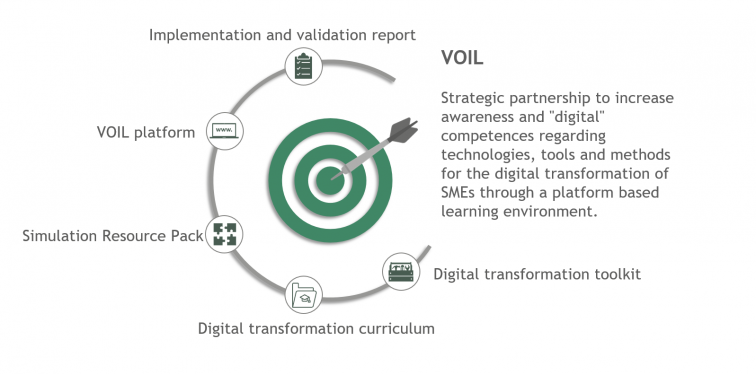
Rapid developments in digitalization pose pressure for firms to innovate and transform their businesses by implementing digital technologies and business models. Many firms struggle with understanding the opportunities and consequences of digitalization. These difficulties are particularly demanding for small firms due to their general lack of resources, knowledge and skills. In order to accelerate the digital transformation of small & medium enterprises, higher education institutions need to adopt effective strategies to develop advanced digital skills in their students, future employees of these companies. Therefore, the target groups of the VOIL project are educators and students in Universities as well as young workers and entrepreneurs/managers of small and medium enterprises.
The project has two main objectives: (1) to raise awareness about the potential of emerging technologies, tools and methods in the course of the digital transformation of micro, small & medium enterprises, and (2) to design a pedagogical model for simulation-based learning of advanced digital competencies.
To achieve these objectves the project will develop 5 Outputs. The O1 - Digital transformation toolkit provides the knowledge about the best practices that have come to affirm in the industry relative to the design of digital transformation strategies and co-creation of innovative solutions. This knowledge will then be used to produce O2 - Digital transformation curriculum, which will guide educators who want to develop training programs focusing on the development of advanced digital skills.
The O3-Simulation Resource Pack will include teaching notes that will guide the learning of emerging technologies and / or digital transformation impacts through the use of simulators. The VOIL platform (O4) corresponds to the simulation-based learning environment that will allow for the development of the advanced digital skills. O5 - Implementation and validation report is an essential output as it contains the partner experience and the project memory. This information will support the use of the VOIL platform beyond the project as well as future developments including the creation of mixed reality learning environments.
The immediate impact of the VOIL project will be empowering universities to develop advanced digital transformation competencies in their students and educators. We expect to involve about 300 participants in the pilot tests & multiplier events in the various partner countries. For the long-term impact, & taking into account the planned dissemination activities, we have estimated that in the partner countries a high number of young workers will be informed through the outputs in their native languages. Another expected long-term impact is to provide educators in universities with a curriculum to guide the design of study programs & courses to develop advanced digital transformation skills. We envisage that the project results have the R&D potential of informing and engaging researchers from the fields of engineering, management and social sciences in discussions and studies focusing on the use of simulators to experiment and learn about emerging technologies.
